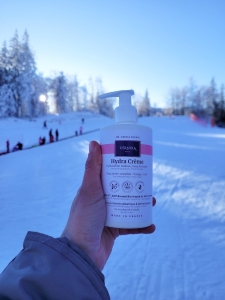Reading Time: mins
Hello parents! 😊
In this article, we explore the world of dry baby skin. We know how important it is for you to look after your little one's delicate skin, and we're here to help with advice based on sound scientific research. So relax and find out how you can protect your baby's skin from breech irritation and redness.
Babies' skin is extremely delicate and susceptible to dryness and irritation REF [^1^]. Understanding the specific needs of your baby's skin is crucial to maintaining healthy skin. Dry skin in babies can be caused by a variety of factors, such as environmental conditions, inappropriate skin care products and frequent bathing REF [^2^];
Dry skin in a baby can be identified by the following characteristics:
Dry skin in babies can have several causes:
It's important to note that dry skin in babies is usually temporary, and improves with simple measures such as adequate hydration, the use of gentle, non-aggressive skin care products and protection from environmental elements.
To care for baby's dry skin, it's essential to adopt a skincare routine that's both gentle and moisturizing. Using skin care products specially formulated for babies can help restore skin moisture and relieve REF[^5^] irritation. Hydra Lavant Vernixa gently cleanses, preserving and strengthening the skin barrier, while Hydra Crème Vernixa nourishes the skin, providing essential ingredients for its reinforcement.
We recommend spacing out baths and using lukewarm water to avoid further dehydrating the baby's skin. What's more, using gentle, hypoallergenic bath products can help preserve the skin's natural oils and prevent de-lipidation.
Using non-irritating skin care products is crucial to avoid redness and irritation. Opt for products with low fragrance concentrations and tested under dermatological and pediatric supervision, to ensure the safety and comfort of your baby's skin.
Make sure products are specifically adapted for babies and children under 3. Cosmetic regulations for these products are rigorous, requiring specific and costly tests to guarantee their safety.
Using hypoallergenic detergents with as little fragrance as possible for baby clothes can also reduce the risk of skin irritation. These detergents are formulated without harsh ingredients and are gentle on babies' sensitive skin.
Dry skin care is essential for maintaining skin hydration and preventing irritation and redness. They are formulated with ingredients such as ceramides and essential fatty acids that help strengthen the skin barrier and prevent skin moisture from evaporating.
Baby skin is thinner, more sensitive and has a less developed cutaneous barrier than adult skin. It is therefore more susceptible to irritation, infection and dehydration. Taking care of baby's skin requires special attention and the use of appropriate products.
A baby's dry or atopic skin can be recognized by signs such as redness, itching, flaking and tightness. In severe cases, cracks and scabs may also appear.
Diaper rash is not inevitable and can be prevented with appropriate care. Using protective creams and quality diapers can help prevent irritation and keep baby's skin healthy.
It's important to take certain precautions to avoid diaper rash and irritation, such as frequent diaper changes, gentle cleaning of the diaper area and the use of protective creams.
For babies with very dry, atopic skin, it's essential to use specially formulated skin care products and maintain a humidified environment. Avoid potential irritants such as perfumes and dyes, and opt for soft cotton clothing.
To care for your baby's dry patches, use moisturizing and soothing creams specially formulated for dry, sensitive skin. Avoid products containing irritants and maintain a humid environment to prevent dryness.
Dear parents, we understand how important it is for you to take care of your baby's delicate skin. That's why we've developed a range of products specially formulated to meet the unique needs of babies' skin.
Our products are gentle, moisturizing, formulated with 100% natural ingredients and scientifically proven to moisturize, nourish and protect your baby's skin. They are ideal for babies with sensitive, dry or atopic skin.
Find out how Vernixa® can help prevent and soothe skin irritation in your baby. 🌿👶
All our products are tested under pediatric and dermatological control.
Although our content is based on scientific and medical sources and we have skin care experts on our team, we advise you to consult a doctor or dermatologist for medical advice, as each case and situation is different and our content is not a substitute for medical advice.
REF [^3^] The Relationship of the Use of Powder in the Genetalia Area of Babies Aged 0-9 Months to the Event of Diaper Rash at PMB Fadilah, Bulukagung Madura Village, Formosa Journal of Science and Technology
All Rights Reserved | Tous Droits Réservés GTIN Compliance Hydra Lavant | GTIN Compliance Hydra Crème



